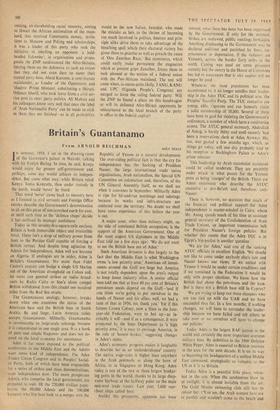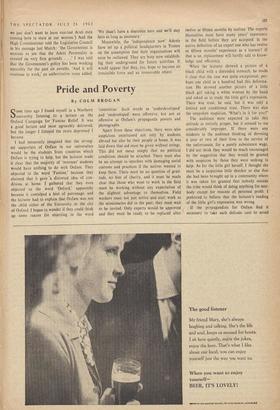Britain's Guantanamo From ARNOLD BE1CHMAN ADEN STATE
N summer, 1959, 1 sat in the drawing-room I of the Governor's palace in Nairobi, talking with Sir Evelyn Baring. In time, he said, Kenya would enjoy far greater self-government and, perhaps, sonic day would achieve its indepen- dence. But come what may, while Britain ruled Kenya. Jomo Kenyatta, then under custody in the north, would 'never' be freed.
That word `never' came back to memory here as I listened to civil servants and Foreign Office
envoys describe the Government's determination to sit on this piece of sun-scorched earth for ever, or until such time as the 'defence chaps' decide
it has outlived its strategic usefulness. • Today in this seventy-five-square-mile enclave, Britain is both immovable object and irresistible force. There isn't a drop of military power from
Suez to the Persian Gulf capable of forcing a British retreat. And despite long agitation by
Adenis for independence, Aden will not become an Algeria. If analogies are in order, Aden is Britain's Guantanamo. No more than Fidel Castro's oratory can budge a single US Marine out of the American stronghold on Cuban soil, no more can general strikes or radio broad- casts by Radio Cairo or San'a alone compel British withdrawal from this citadel one hundred miles from the Red Sea straits.
The Guantanamo analogy, however, breaks down when one examines the status of the American base and the British base in South Arabia. By and large, Latin America today accepts Guantanamo. Militarily, Guantanamo
is invulnerable to large-scale sabotage because it is concentrated in one single area. It is a hunk of pure and simple firepower and does not de- pend on the local economy for sustenance.
Aden is far more exposed to the political sandstorms in the Middle East and the Adenis want some kind of independence. The Aden 'I rades Union Congress and its Peoples' Social- ist Party, both of which have been responsible for a series of strikes and mass demonstrations, want independence now. The more prosperous Adenis, tivho comprise the local government, are prepared to wait. Of the 220,000 civilian popu- lation, the 80,000 Adenis and the 100,000 Yemenis w ho live here look to a merger with the Republic of Yemen as a natural development. The over-riding political fact is that the cry for independence has the backing of President Nasser, the large international trade union
organisations, Arab nationalism, the Special UN Committee on colonialism and, therefore, of the ' UN General Assembly itself, as we shall see when it convenes in September. Militarily Aden
is ripe for hit-and-run bombings and sabotage because its works and infra-structure are scattered over the territory. No doubt we shall have some experience of this before the year is out.
A major asset, other than military might, on the side of continued British occupation, is the
support of the American Government. One of the most august US diplomats in the Middle East told me a few days ago: 'We do not want to see the British base out of Aden.'
Such American firmness is due largely to the fact that the Middle East is what Washington terms `a low priority area.' American oil invest- ments around the Gulf are huge but America is not totally dependent upon the area's output to keep home industry alive. A senior official here told me that at least 80 per cent of Britain's petroleum needs depend on the Gulf—'and if you think we're going to put ourselves in the hands of Nasser and his allies, well, we had a taste of that in 1956; no, thank you.' Yet if this former Crown Colony, now a State in the four- year-old Federation, were to hot up—as in- evitably it will—and if as a consequence, it were promoted by the State Department to 'a high priority area,' it is easy to envisage America, in the role of 'honest broker,' suggesting changes in Aden's status.
Aden's economic progress makes it laughable to describe her as an 'underdeveloped' country.
The native wage-scale is higher than anywhere in the Arab peninsula or along the horn of Africa, or in Singapore or Hong Kong. Aden today is one of the two or three largest bunker- ing ports in the world, thanks to its large deep- water harbour at the halfway point on the main east-west trade routes. Last year, 5,600 mer- chant ships called here.
Amidst this prosperity, agitation has been limited; w hat there has been has been suppressed by the Government, if only for the momeni. Strikes are outlawed, public meetings forbidden. Anything displeasing to the Government may be declared seditious and punished by fines, im- prisonment or deportation, if the violators are Yemenis, across the border forty miles to the north. Caning was used on some prisoners recently but the outcry in the House of Commons has led to assurances that le vice anglais will no longer be used.
Whatever the local population has been accustomed to, it no longer satisfies their leader- ship in the Aden TUC and its political arm. the Peoples' Socialist Party. The TUC executive are young, able, vigorous and can honestly claim a solid membership of 18,000. Several of them have been in gaol for violating the Government's ordinances, a number of which have a totalitarian aroma. The ATUC general secretary, Abdeullah al Asnag, is barely thirty and until recently had been a reservations clerk at Aden Airways. He, too, was gaoled a few months ago, which, as things go today, will one day probably lead to his reception at Buckingham Palace as Aden's prime minister.
This leadership by Arab nationalist standards could. be called moderate. They are presently under attack in what passes for the Yemeni press as being 'stooges' of the British. There are Adeni extremists who describe the ATUC executive as pro-Ba'ath and, therefore. anti- Nasser.
There is, however, no question that much of the financial and political support -for Aden independence is master-minded in Cairo, where Mr. Asnag spends much of his time as assistant general secretary of the Confederation of Arab Trade Unions, an important transmission belt for President Nasser's foreign policies. But whether this meant that the Aden TUC is in Egypt's hip-pocket is another question
`We are for Aden,' said one of the ranking ATUC officials in excellent English. 'We should not like to. come under anybody else's rule and Nasser knows our views. If we united with
Yemen it would be under certain conditions and if we remained in the Federation it would be only with proper elections. We know how the British feel about the petroleum and the base. But is there not a British base still in Cyprus? `We are trying to keep out those elements who are too tied up with the UAR and we have succeeded thus far. In a few months, if nothing
changes, we. will have to surrender the leader- ship because we have failed and tell others to take over or we ourselves will have to change our policies.'
Today Aden is the largest RAF station in the world and certainly the most important overseas military base. By definition in the 1960 Defence White Paper, Aden is essential to British interests in the area for the next decade. It is on its way to becoming the headquarters of a unified Middle East command, strategically as ' valuable to the US as it is to Britain.
Today Aden is a peaceful little place, w hite- hot in the sun. When the sandstorms blow in
at twilight, it is almost invisible from the air. The Gold Mouhr swimming club still has its colour bar. ('You see, the Arab women here are in purdah and wouldn't come to the beach and we just don't want to have married Arab men coming here to stare at our women.) And the High Commissioner told the Legislative Council in his message last March: 'the Government is anxious to see that the Adeni Personality is created on very firm grounds. . . I was told that the Government's policy has been working smoothly for the past six months. 'And it will continue to work,' an authoritative voice added. 'We shan't have a shambles here and we'll stay here as long as necessary.'
Meanwhile, the 'independence now' Adenis have set up a political headquarters in Yemen on the assumption that their organisations will soon be outlawed. They are busy now establish- ing their underground for future activities. It would appear that they, too, hope to become an irresistible force and an immovable object.







































 Previous page
Previous page